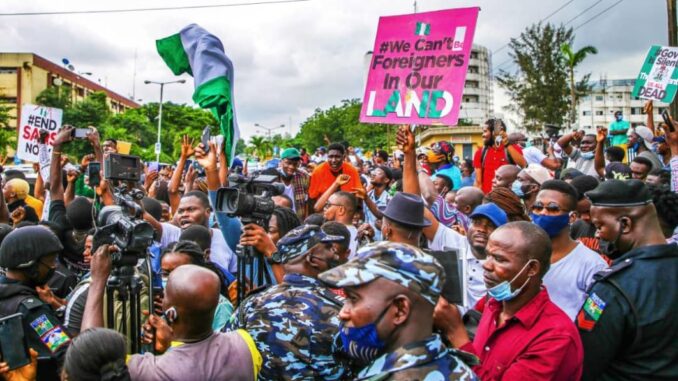
The recent nation-wide protest to end the obnoxious operations of the Special Anti-Robbery Squad of the Nigerian Police Force, otherwise tagged #EndSARS, has left behind a lot of negative effects on the Nigerian economy.
The manifestations of the effects are bound to be pronounced in the weeks ahead, and will certainly constitute a huge challenge to the country. Governments at all levels need to act urgently to provide a recovery stimulus to assist affected stakeholders and by extension, the economy.
This protest came at a time the economy was tottering and gasping for breath because of the devastating effects of the COVID-19 pandemic and the global lockdown that ensued. The negative effect, which the pandemic has had on the global oil market has been largely unpalatable on the Nigerian economy. Over this period, oil prices plummeted to as low as $25 per barrel, with devastating effects on government revenue. Prior to that, the state of the economy had been very precarious with many stakeholders, including government officials, anticipating an onset of another economic recession given that the GDP growth rate for the second quarter of 2020 had a whopping negative value of -6.1 per cent.
Expectation that the third-quarter GDP growth figures would also be negative has fuelled this anticipation of an impending recession, which would be the third in the country’s economic history. In a clear display of the poor state of the economy, macroeconomic indicators have not been desirable, with the inflation rate at over 13 per cent year-on-year, unemployment rate over 27 per cent, and the naira-dollar exchange rate recording values in the region of N450 in the parallel market. Invariably, these negative parameters represent a very sad commentary on the management of the economy, irrespective of the effects of COVID-19. The easing of the lockdown across many economies globally, prior to the onset of the #EndSARS protest in October 2020, had provided the much-needed breathing space for the economy with global oil prices manifesting progressive increases and inching up to the current average of about $40 per barrel.
Doubtless, the EndSARS protest dealt a big blow on the economy such that the slight recovery experienced with the easing of the lockdown was whittled away – leading to some significant setback for both the public and private sectors of the economy. The hijacking of the protests by hoodlums and the massive destruction of businesses and public property over the period following the Lekki controversial shooting of October 20, 2020, aggravated the decline of the economy with great loss to small businesses as well as the government. The damage runs into trillions of naira, by some estimates. Indeed, the crisis has posed a great risk to the Nigerian economy. The question now is how the needed to remedy can be brought on the already bad situation.
How and from where will funds be obtained to make up for the great losses experienced during the crisis? Will the country resort to further borrowing? For an economy that is largely public sector-driven and whose revenue sources are drying up with an unsustainable level of public debt, how can the country navigate through this crisis, to keep the economy on a path of recovery again? This is a great challenge, not only for the Federal Government but for all the state governments in the convoluted federation.
In the main, the government should first and foremost take adequate stock of the damage to the economy, to ascertain clearly the magnitude, particularly as it affects the micro, small, and medium scale enterprises. Many of these small businesses are the products of years of painstaking investments by their promoters, many of whom were hitherto unemployed individuals who had struggled to eke out a living for themselves through such ventures. They need urgent and substantial assistance from the government. These individuals contribute significantly to the economy, particularly to job creation as they employ two, three, up to ten individuals in their various enterprises. Government, at both federal and state levels, needs to develop a “Marshall Plan” to quickly give back life to these destroyed enterprises. These business owners should not be left to roam without any means of livelihood.
x
Some efforts are also required to make credit easily available in the economy. It is gladdening to note that the Monetary Policy Committee of the Central Bank of Nigeria has reduced the Bank’s monetary policy rate by 100 basis points to 11.5 per cent thus making credit relatively cheaper. This should be supported by other policy designs to ensure that the economy is brought back to life, in support of the economic recovery from the effects of COVID-19.
It is also gladdening that reports from the CBN indicate that the country’s foreign reserves have recorded some increase. Other ancillary issues bordering on prevailing uncertainty in the direction of the economy should be addressed. These include a concerted effort to improve insecurity, manage the increasing public debt burden, and make effort to reverse the falling inflow of foreign capital inflow, among others. Overall, the stimulus to owners of looted shops should be urgent; else the negative economic effects could be aggravated.
END

Be the first to comment